- Home
- Michael Crichton
Next Page 5
Next Read online
Page 5
“I’m sorry,” Barry Sindler said. “Run that by me again, Mr. Diehl. What did you just say?”
“I said, ‘I want my wife tested.’”
“I can assure you, these proceedings will test her to the limit. And of course we’ll put a detective on her, see how much she drinks, whether she does drugs, stays out all night, has lesbian affairs, all that. Standard procedure.”
“No, no,” Diehl said. “I want her tested genetically.”
“For what?”
“For everything,” he said.
“Ah,” Barry said, nodding wisely. What the hell was the guy talking about? Genetic testing? In a custody case? He glanced down at the papers in front of him, and the business card.RICHARD “RICK” DIEHL, PH.D. Barry frowned unhappily. Only assholes put a nickname on the card. The card said he was CEO of BioGen Research Inc., some company out in Westview Village.
“For example,” Diehl said, “I’ll bet my wife has a genetic predisposition to bipolar illness. She certainly acts erratic. She might have the Alzheimer’s gene. If she does, psychological tests could show early signs of Alzheimer’s.”
“Good, very good.” Barry Sindler was nodding vigorously now. This was making him happy. Fresh, new disputed areas. Sindler loved disputed areas. Administer the psychological test. Did the test show early Alzheimer’s or not? Who the fuck could say for sure? Wonderful, wonderful—whatever the test results, they would be disputed. More days in court, more expert witnesses to interview, battles of the doctorates, dragging on for days. Days in court were especially lucrative.
And best of all, Barry realized that this genetic testing could become standard procedure for all custody cases. Sindler was breaking new ground here. He’d get publicity for this! He leaned forward eagerly. “Go on, Mr. Diehl…”
“Test her for the diabetes gene, breast cancer from theBRCA genes, and all the rest. And,” Diehl continued, “my wife might also have the gene for Huntington’s disease, which causes fatal nerve degeneration. Her grandfather had Huntington’s, so it’s in her family. Both her parents are still young, and the disease only shows up when you’re older. So my wife could be carrying the gene and that would mean a death sentence from Huntington’s.”
“Umm, yes,” Barry Sindler said, nodding. “That could render her unfit to be the primary caregiver to the children.”
“Exactly.”
“I’m surprised she hasn’t been tested already.”
“She doesn’t want to know,” Diehl said. “There’s a fifty-fifty chance she may have the gene. If she does, she’ll eventually develop the disease and die writhing in dementia. But she’s twenty-eight. The disease might not appear for another twenty years. So if she knew about it now…it could ruin the rest of her life.”
“But it could also relieve her, if she didn’t have the gene.”
“Too big a risk. She won’t test.”
“Any other tests you can think of?”
“Hell yes,” Diehl said. “That’s just the beginning. I want her tested with all the current panels. There are twelve hundred gene tests now.”
Twelve hundred! Sindler licked his lips at the prospect. Excellent! Why had he never heard of this before? He cleared his throat. “But you realize that if you do this, she will demand you be tested, as well.”
“No problem,” Diehl said.
“You’ve already been tested?”
“No. I just know how to fake the lab results.”
Barry Sindler sat back in his chair.
Perfect.
CH004
Beneath thehigh canopy of trees, the jungle floor was dark and silent. No breeze stirred the giant ferns at shoulder height. Hagar wiped sweat from his forehead, glanced back at the others, and pushed on. The expedition moved deep into the jungles of central Sumatra. No one spoke, which was the way Hagar liked it.
The river was just ahead. A dugout canoe on the near bank, a rope stretched across the river at shoulder height. They crossed in two groups, Hagar standing up in the dugout, pulling them across on the rope, then going back for the others. It was silent except for the cry of a distant hornbill.
They continued on the opposite bank. The jungle trail grew narrower, and muddy in spots. The team didn’t like that; they made a lot of noise trying to scramble around the wet patches. Finally, one said, “How much farther is it?”
It was that kid. The whiny American teenager with spots on his face. He was looking to his mother, a largish matron in a broad straw hat.
“Are we almost there?” the kid whined.
Hagar put his finger to his lips. “Quiet!”
“My feet hurt.”
The other tourists were standing around, a cluster of bright-colored clothing. Staring at the kid.
“Look,” Hagar whispered, “if you make noise, you won’t see them.”
“I don’t see them anyhow.” The kid pouted, but he fell into line as the group moved on. Today they were mostly Americans. Hagar didn’t like Americans, but they weren’t the worst. The worst, he had to admit, were the—
“There!”
“Look there!”
The tourists were pointing ahead, excited, chattering. About fifty yards up the trail and off to the right, a juvenile male orangutan stood upright in the branches that swayed gently with his weight. Magnificent creature, reddish fur, roughly forty pounds, distinctive white streak in the fur above his ear. Hagar had not seen him in weeks.
Hagar gestured for the others to be quiet, and moved up the trail. The tourists were close behind him now, stumbling, banging into one another in their excitement.
“Ssssh!” he hissed.
“What’s the big deal?” one said. “I thought this was a sanctuary.”
“Ssssh!”
“But they’re protected here—”
“Ssssh!”
Hagar needed it quiet. He reached into his shirt pocket and pressed the Record button. He unclipped his lapel mike and held it in his hand.
They were now about thirty yards from the orang. They passed a sign along the trail that saidBUKUT ALAM ORANGUTAN SANCTUARY . This was where orphaned orangs were nursed to health, and reintroduced into the wild. There was a veterinary facility, a research station, a team of researchers.
“If it’s a sanctuary, I don’t understand why—”
“George, you heard what he said. Be quiet.”
Twenty yards, now.
“Look, another one! Two! There!”
They were pointing off to the left. High in the canopy, a one-year-old, crashing through branches with an older juvenile. Swinging gracefully. Hagar didn’t care. He was focused on the first animal.
The white-streaked orang did not move away. Now he was hanging by one hand, swinging in the air, head cocked to one side as he looked at them. The younger animals in the canopy were gone. White-streak stayed where he was, and stared.
Ten yards. Hagar held his microphone out in front of him. The tourists were pulling out their cameras. The orang stared directly at Hagar and made an odd sound, like a cough.“Dwaas.”
Hagar repeated the sound back. “Dwaas.”
The orang stared at him. The curved lips moved. A sequence of guttural grunts:“Ooh stomm dwaas, varlaat leanme.”
One of the tourists said, “Is he making those sounds?”
“Yes,” Hagar said.
“Is he…talking?”
“Apes can’t talk,” another tourist said. “Orangs are silent. It says so in the book.”
Several snapped flash pictures of the hanging ape. The juvenile male showed no surprise. But the lips moved:“Geen lichten dwaas.”
“Does he have a cold?” a woman asked nervously. “Sounds like he’s coughing?”
“He’s not coughing,” another voice said.
Hagar glanced over his shoulder. A heavyset man at the back, a man who had struggled to keep up, red-faced and puffing, now held a tape recorder in his hand, pointing it toward the orang. He had a determined look on his face. He said to Hagar, �
�Is this some kind of trick you play?”
“No,” Hagar said.
The man pointed to the orang. “That’s Dutch,” he said. “Sumatra used to be a Dutch colony. That’s Dutch.”
“I wouldn’t know,” Hagar said.
“I would. The animal said, ‘Stupid, leave me alone.’ And then it said, ‘No lights.’ When the camera flashes went off.”
“I don’t know what those sounds were,” Hagar said.
“But you were recording them.”
“Just out of curiosity—”
“You had your microphone out long before the sounds began. You knew that animal would speak.”
“Orangs can’t speak,” Hagar said.
“That one can.”
They all stared at the orangutan, still swinging from one arm. It scratched itself with the free arm. It was silent.
The heavyset man said loudly,“Geen lichten.”
The ape just stared, blinked slowly.
“Geen lichten!”
The orang gave no sign of comprehension. After a moment, he swung to a nearby branch, and began to climb into the air, moving easily, arm on arm.
“Geen lichten!”
The ape kept climbing. The woman in the big straw hat said, “I think it was just coughing or something.”
“Hey,” the heavyset man yelled.“M’sieu! Comment ça va?”
The ape continued up through the branches, swinging in an easy rhythm with its long arms. It did not look down.
“I thought maybe it speaks French,” the man said. He shrugged. “Guess not.”
A light rain began to drip from the canopy. The other tourists put their cameras away. One shrugged on a light, transparent raincoat. Hagar wiped the sweat from his forehead. Up ahead, three young orangs were scampering around a tray of papayas on the ground. The tourists turned their attention to them.
From high in the canopy came a growling sound:“Espèce de con.” The phrase came to them clearly, surprisingly distinct in the still air.
The heavyset man spun around.“What?”
Everyone turned to look upward.
“That was a swear word,” the teenager said. “In French. I know it was a swear word. In French.”
“Hush,” his mother said.
The group stared up at the canopy, searching the dense mass of dark leaves. They could not see the ape up there.
The heavyset man yelled,“Qu’est-ce que tu dis?”
There was no answer. Just the crash of an animal moving through branches, and the distant cry of a hornbill.
CHEEKY CHIMP CHEWS OFF TOURISTS
(News of the World)
AFFE SPRICHT IM DSCHUNGEL, FLÜCHE GEORGE BUSH
(Der Spiegel)
ORANG PARLE FRANÇAIS?!!
(Paris Match,beneath a picture of Jacques Derrida)
MUSLIM MONKEY BERATES WESTERNERS
(Weekly Standard)
MONKEY MOUTHS OFF, WITNESSES AGAPE
(National Enquirer)
TALKING CHIMPANZEE REPORTED IN JAVA
(New York Times,subsequent correction printed)
POLYGLOT PRIMATES SIGHTED IN SUMATRA
(Los Angeles Times)
“And, finally, a group of tourists in Indonesia swear they were abused by an orangutan in the jungles of Borneo. According to the tourists, the ape swore at them in Dutch and French, which means it was probably a lot smarter than they were. But no recordings of the cursing chimp have turned up, leading us to conclude that if you believe this story, we have a job for you in the current administration. Plenty of talking apes there!”
(Countdown with Keith Olbermann,MSNBC News, no correction)
CH005
Get this,”Charlie Huggins said, looking at the television in the kitchen of his house in San Diego. The sound was turned off, but he was reading the crawl beneath. “It says, ‘Talking Ape Cited in Sumatra.’”
“You mean it got a speeding ticket?” his wife said, glancing at the screen. She was making breakfast.
“No,” Huggins said. “They must mean the ape was ‘sighted.’ With an ‘s.’”
“The ape was sighted? Meaning the ape could see?” His wife was a high school English teacher. She liked these jokes.
“No, honey. The story says…some people in Sumatra encountered an ape in the jungle that talked.”
“I thought apes can’t talk,” his wife said.
“Well, that’s what the story says.”
“So it has to be a lie.”
“You think? Uh, now…Britney Spears is not getting divorced. I’m relieved. She may be pregnant again. From the pictures it looks like it. And Posh Spice wore a nice green dress to a gala. And Sting says he can have sex for eight hours without stopping.”
“Scrambled or over easy?” his wife said.
“Tantric, apparently.”
“I mean your eggs.”
“Scrambled.”
“Call the kids, will you?” she said. “Everything’s almost ready.”
“Okay.” Charlie got up from the table and headed for the stairs. When he got to the living room, the phone rang. It was the lab.
In the laboratories of Radial Genomics Inc., in the eucalyptus groves of the University of California at San Diego, Henry Kendall drummed his fingers on the countertop while he waited for Charlie to pick up. The phone rang three times. Where the fuck was he? Finally, Charlie’s voice: “Hello?”
“Charlie,” Henry said. “Did you hear the news?”
“What news?”
“The ape in Sumatra, for Christ’s sake.”
“That has to be bullshit,” Charlie said.
“Why?”
“Come on, Henry. You know it’s bullshit.”
“They said the ape spoke Dutch.”
“It’s bullshit.”
“It might have been Uttenbroek’s team,” Kendall said.
“Nah. The ape was big, two or three years old.”
“So? Uttenbroek could have done it a few years ago. His team’s advanced enough. Besides, those guys from Utrecht are all liars.”
Charlie Huggins sighed. “It’s illegal in the Netherlands to do that research.”
“Right. Which is why they would go to Sumatra to do it.”
“Henry, the technology’s much too difficult. We’re years away from making a transgenic ape. You know that.”
“I don’t know that. You hear what Utrecht announced yesterday? They harvested bull stem cells and cultured them in mouse testicles. I would saythat is difficult. I would say that is fucking cutting edge.”
“Especially for the bulls.”
“I don’t see anything funny here.”
“Can’t you imagine the poor mice, dragging around giant purple bulls’ balls?”
“Still not laughing…”
“Henry,” Charlie said. “Are you telling me you see one report on television about a talking ape, and you actually believe it?”
“I’m afraid I do.”
“Henry.” Charlie sounded exasperated. “It’s television. This story’s right up there with the two-headed snake. Pull yourself together.”
“The two-headed snake was real.”
“I have to get the kids to school. I’ll talk to you later.” And Charlie hung up.
Fucker. His wife always took the kids to school.
He’s avoiding me.
Henry Kendall walked around the lab, stared out the window, paced some more. He took a deep breath. Of course he knew Charlie was right. It had to be a fake story.
But…what if it wasn’t?
It was truethat Henry Kendall had a tendency to be high-strung; his hands sometimes shook when he spoke, especially when he was excited. And he was a bit of a klutz, always stumbling, banging into things at the lab. He had a nervous stomach. He was a worrier.
But what Henry couldn’t tell Charlie was that the real reason he was worried now had to do with a conversation that had taken place a week ago. It seemed meaningless at the time.
Now it took
on a more ominous quality.

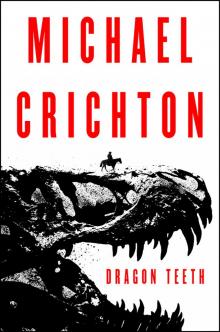 Dragon Teeth
Dragon Teeth Jurassic Park
Jurassic Park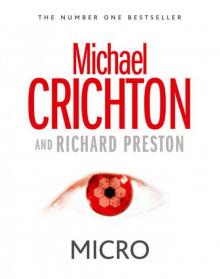 Micro
Micro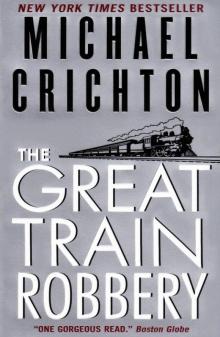 The Great Train Robbery
The Great Train Robbery The Andromeda Strain
The Andromeda Strain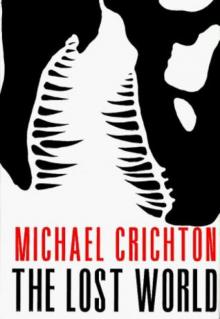 The Lost World
The Lost World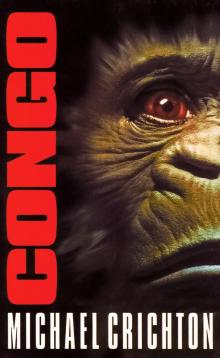 Congo
Congo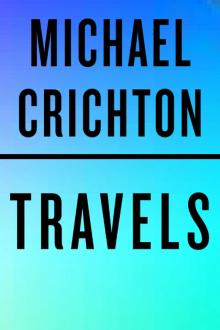 Travels
Travels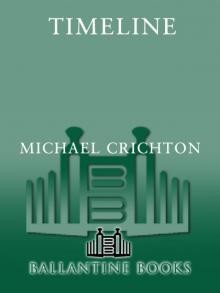 Timeline
Timeline Sphere
Sphere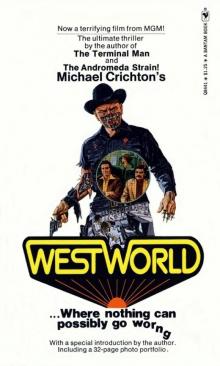 Westworld
Westworld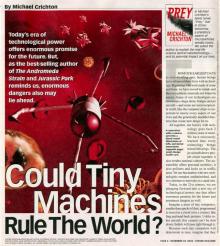 Prey
Prey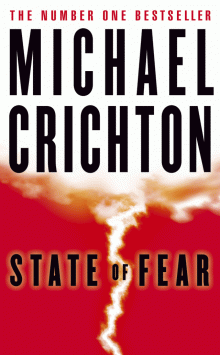 State Of Fear
State Of Fear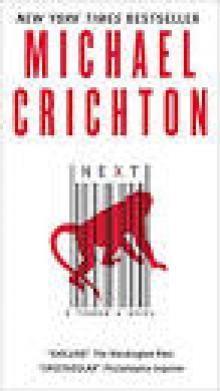 Next
Next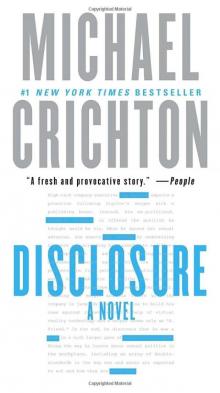 Disclosure
Disclosure Pirate Latitudes
Pirate Latitudes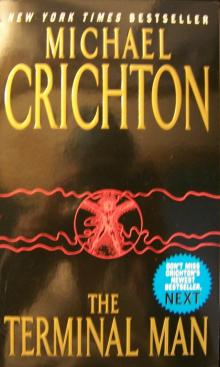 The Terminal Man
The Terminal Man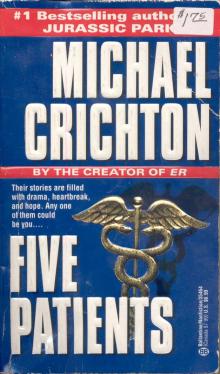 Five Patients
Five Patients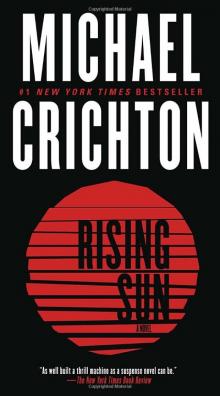 Rising Sun
Rising Sun Binary
Binary The Andromeda Evolution
The Andromeda Evolution Airframe
Airframe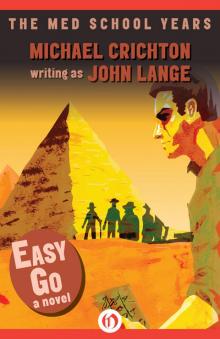 Easy Go
Easy Go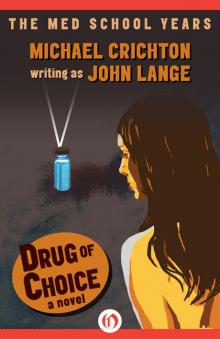 Drug of Choice
Drug of Choice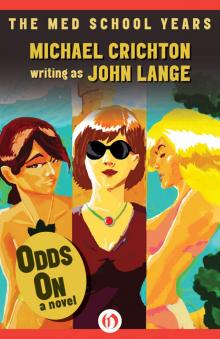 Odds On: A Novel
Odds On: A Novel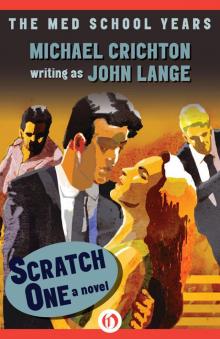 Scratch One
Scratch One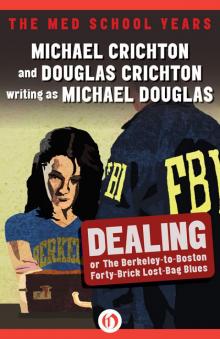 Dealing or The Berkeley-to-Boston Forty-Brick Lost-Bag Blues
Dealing or The Berkeley-to-Boston Forty-Brick Lost-Bag Blues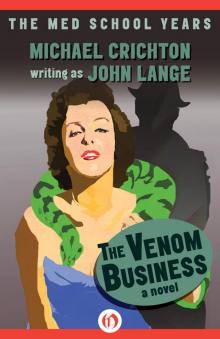 Venom Business
Venom Business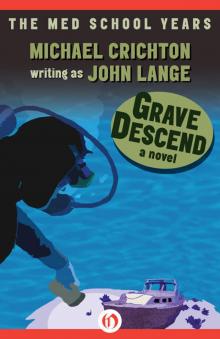 Grave Descend
Grave Descend Gold - Pirate Latitudes
Gold - Pirate Latitudes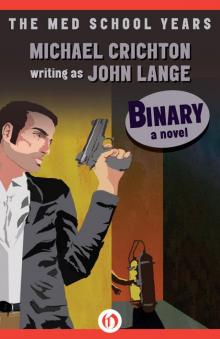 Binary: A Novel
Binary: A Novel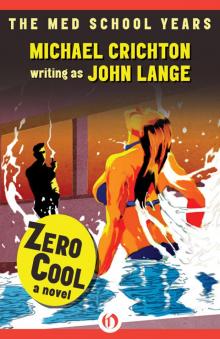 Zero Cool
Zero Cool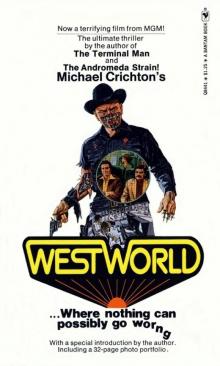 Delos 1 - Westworld
Delos 1 - Westworld